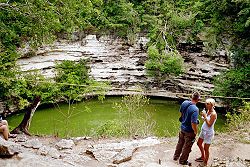Cenote (Land Form)
From Wikipedia, the free encyclopedia.Cenote (pronounced say-no-tay, plural: Cenotes) is the name given in the southern part of Mexico and Central America to freshwater-filled limestone sinkholes. Cenotes are fully or partially collapsed karst caves. Mature cenotes often resemble small, circular lakes or lagoons with vertical edges. The name cenote derives from Yucatec Maya language dznot.
Cenotes have long been major sources of water in much of the Yucatan peninsula, most of which lacks other easily accessible year-round water. The Maya city of Chichen Itza was built around a cluster of these natural wells. Some cenotes like the Cenote of Sacrifice in Chichén Itzá played an important role in Maya rites. Golden sacrificial artifacts were found in such cenotes, leading to the archaeological exploration of most cenotes in the first part of the 20th century.
Some cenotes are now a tourist attraction to divers, however, diving in cenotes can be dangerous because of underwater currents. Open water divers should never attempt to dive a cenote without proper cave/cavern training or certification. Special gear is used to dive cenotes, and while many inhabitants of and visitors to the Yucatan peninsula dive them regularly, proper precautions must be taken. Exploratory divers will at times spend several hours underwater, mapping the underwater rivers that connect the peninsula´s cenotes.
